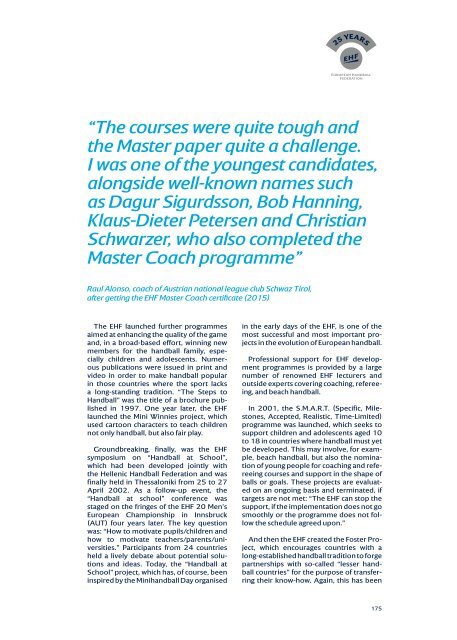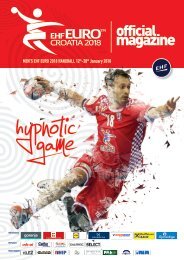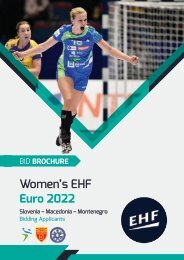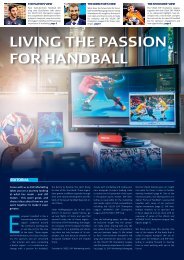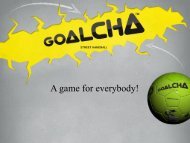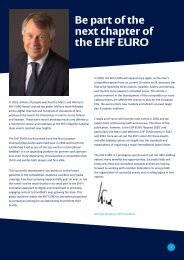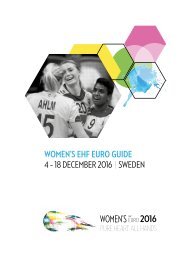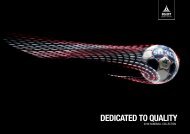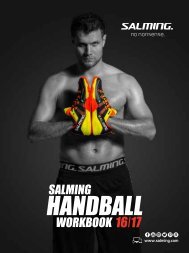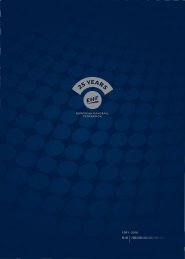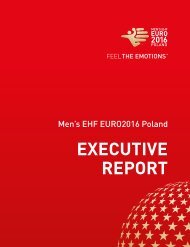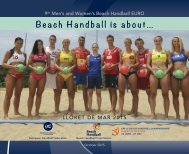ehf_25yers_book_webversion (1)
Create successful ePaper yourself
Turn your PDF publications into a flip-book with our unique Google optimized e-Paper software.
“The courses were quite tough and<br />
the Master paper quite a challenge.<br />
I was one of the youngest candidates,<br />
alongside well-known names such<br />
as Dagur Sigurdsson, Bob Hanning,<br />
Klaus-Dieter Petersen and Christian<br />
Schwarzer, who also completed the<br />
Master Coach programme”<br />
Raul Alonso, coach of Austrian national league club Schwaz Tirol,<br />
after getting the EHF Master Coach certificate (2015)<br />
The EHF launched further programmes<br />
aimed at enhancing the quality of the game<br />
and, in a broad-based effort, winning new<br />
members for the handball family, especially<br />
children and adolescents. Numerous<br />
publications were issued in print and<br />
video in order to make handball popular<br />
in those countries where the sport lacks<br />
a long-standing tradition. “The Steps to<br />
Handball” was the title of a brochure published<br />
in 1997. One year later, the EHF<br />
launched the Mini Winnies project, which<br />
used cartoon characters to teach children<br />
not only handball, but also fair play.<br />
Groundbreaking, finally, was the EHF<br />
symposium on “Handball at School”,<br />
which had been developed jointly with<br />
the Hellenic Handball Federation and was<br />
finally held in Thessaloniki from 25 to 27<br />
April 2002. As a follow-up event, the<br />
“Handball at school” conference was<br />
staged on the fringes of the EHF 20 Men’s<br />
European Championship in Innsbruck<br />
(AUT) four years later. The key question<br />
was: “How to motivate pupils/children and<br />
how to motivate teachers/parents/universities.”<br />
Participants from 24 countries<br />
held a lively debate about potential solutions<br />
and ideas. Today, the “Handball at<br />
School” project, which has, of course, been<br />
inspired by the Minihandball Day organised<br />
in the early days of the EHF, is one of the<br />
most successful and most important projects<br />
in the evolution of European handball.<br />
Professional support for EHF development<br />
programmes is provided by a large<br />
number of renowned EHF lecturers and<br />
outside experts covering coaching, refereeing,<br />
and beach handball.<br />
In 2001, the S.M.A.R.T. (Specific, Milestones,<br />
Accepted, Realistic, Time-Limited)<br />
programme was launched, which seeks to<br />
support children and adolescents aged 10<br />
to 18 in countries where handball must yet<br />
be developed. This may involve, for example,<br />
beach handball, but also the nomination<br />
of young people for coaching and refereeing<br />
courses and support in the shape of<br />
balls or goals. These projects are evaluated<br />
on an ongoing basis and terminated, if<br />
targets are not met: “The EHF can stop the<br />
support, if the implementation does not go<br />
smoothly or the programme does not follow<br />
the schedule agreed upon.”<br />
And then the EHF created the Foster Project,<br />
which encourages countries with a<br />
long-established handball tradition to forge<br />
partnerships with so-called “lesser handball<br />
countries” for the purpose of transferring<br />
their know-how. Again, this has been<br />
175


